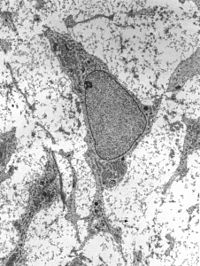
Photo from wikipedia
Osteoarthritis (OA) causes severe degeneration of the meniscus and cartilage layer in the knee and endangers joint integrity and function. In this study, we utilized tumor necrosis factor α (TNFα)… Click to show full abstract
Osteoarthritis (OA) causes severe degeneration of the meniscus and cartilage layer in the knee and endangers joint integrity and function. In this study, we utilized tumor necrosis factor α (TNFα) to establish in vitro OA models and analyzed the effects of dehydrocorydaline (DHC) on cell proliferation and extracellular matrix (ECM) synthesis in human chondrocytes with TNFα treatment. We found that TNFα treatment significantly reduced cell proliferation and mRNA and protein expression levels of aggrecan and type II collagen, but caused an increase in mRNA and protein expression levels of type I collagen, matrix metalloproteinase 1/13 (MMP1/13), and prostaglandin-endoperoxide synthase 2 (PTGS2, also known as Cox2) in human chondrocytes. DHC significantly promoted the cell activity of normal human chondrocytes without showing cytotoxity. Moreover, 10 and 20 μM DHC clearly restored cell proliferation, inhibited mRNA and protein expression levels of type I collagen, MMP 1/13, and Cox2, and further increased those of aggrecan and type II collagen in the TNFα-treated human chondrocytes. RNA transcriptome sequencing indicated that DHC could improve TNFα-induced metabolic abnormalities and inflammation reactions and inhibit the expression of TNFα-induced inflammatory factors. Furthermore, we found that the JAK1-STAT3 signaling pathway was confirmed to be involved in the regulatory effects of DHC on cell proliferation and ECM metabolism of the TNFα-treated human chondrocytes. Lastly, to explore the effects of DHC in vivo, we established an anterior cruciate ligament transection (ACLT)-stimulated rat OA model and found that DHC administration significantly attenuated OA development, inhibited the enzymatic hydrolysis of ECM, and reduced phosphorylated JAK1 and STAT3 protein expression in vivo after ACLT for 6 weeks. These results suggest that DHC can effectively relieve OA progression, and it has a potential to be utilized for the clinical prevention and therapy of OA as a natural small molecular drug.
Journal Title: International Journal of Molecular Sciences
Year Published: 2022
Link to full text (if available)
Share on Social Media: Sign Up to like & get
recommendations!